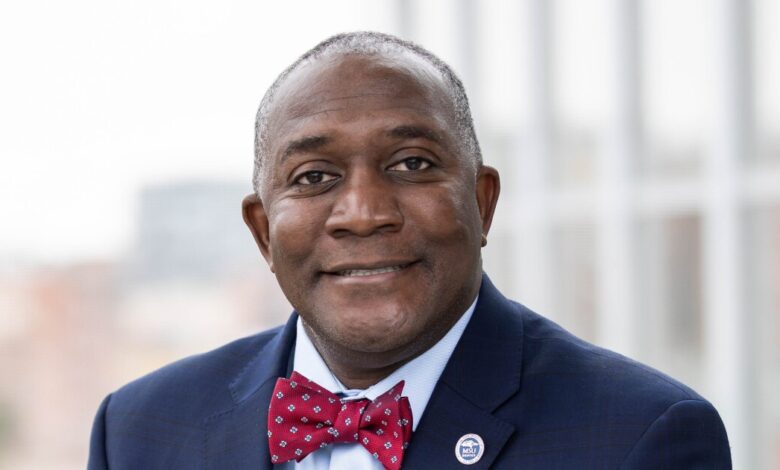A University Paused a Long-Awaited Plan to Reduce Faculty Workload. Then the Plan’s Booster Stepped Down.

The provost of Metropolitan State University of Denver is stepping down after the institution’s Board of Trustees put on hold a plan to reduce faculty workload that he’d advocated.
Faculty members at MSU-Denver had for decades talked about cutting down workloads, not simply the teaching load, and Alfred W. Tatum said that he’d “embraced” the project “as my supreme charge as provost.” Under a proposal backed by Tatum and the Faculty Senate, most tenure-track and non-tenure-track faculty members would go from teaching four classes per semester to three, without an accompanying increase in research or service expectations, beginning this fall. The goal of the proposal was to enable the faculty to “maintain the vitality of its programs while affording faculty the time to think innovatively to revise academic programs when warranted to best serve the needs and aspirations of traditional, non-traditional, and transfer students,” Tatum wrote.
But concerns about the plan’s long-term financial viability prompted MSU-Denver’s board to pause the plan, highlighting the tension between two pandemic-driven forces that have dominated higher ed in the past three years — faculty burnout and financial constraint.
The decision to delay the plan, months before it was set to go into effect, came as a shock to faculty and administrators, Colorado Public Radio reported. But the board thought it didn’t have adequate information to move forward, Kristin Hultquist, the vice chair, told The Chronicle. After hearing a presentation from Tatum in late January about how the plan would be rolled out — including the hiring of about 78 new faculty members at a cost of $7.4 million in the 2023 fiscal year — board members posed questions about its long-term financial implications and about whether the plan would impede MSU-Denver’s ability to pay faculty well.
“We reached the conclusion that we didn’t have, ourselves as a board, the level of information we needed to take this significant step,” Hultquist said. “So we asked our president, ‘Do you have the information you need to make a recommendation?’ And she told us, ‘Frankly, I don’t.’” Together, Hultquist said, the board and the university’s president, Janine A. Davidson, decided they needed more time and information.
‘Can We Afford It?’
The idea of reducing workload has been a goal for “close to 20 years,” Tatum wrote in the proposal. “This request hit a crescendo during the Covid-19 pandemic.” Hultquist acknowledged that the board knew that cutting workload was a “stated priority” of MSU-Denver’s Faculty Senate. “This is not a brand-new conversation for us. But what is important is that the strategic decision to extend this policy to all of our tenure and tenure-line faculty is really a significant budget question, and significant budget questions are the fiduciary responsibility of the board,” she said.
At the same time, she added, among the board’s priorities is ensuring that faculty members feel valued and that their concerns about workload and pandemic-induced fatigue are heard. “While we deeply understand and respect that this would be a good direction for our faculty and for our students, it’s, Can we afford it? How much can we afford, and what can we afford now?” Hultquist said. She cited enrollment declines and low state funding — among states, Colorado had the second-lowest allocation of higher-education funding per student in 2021, according to federal data — as additional constraints on the institution’s budget.
In a memo on January 31, Davidson informed faculty members the plan was being delayed, noting the board believed it could have “critical implications for budget and mission.” That announcement was met with consternation from many who’d already begun planning fall schedules, CPR reported. But Hultquist said she’s also heard from faculty who favor the pause.
Davidson’s memo said that the board would discuss the issue at its fall retreat, though Hultquist said a decision could come sooner. “If we have the information we need before then, we’ll make a decision before then,” she said.
In the meantime, MSU-Denver faces the loss of Tatum, who commissioned a committee to explore the possibility of trimming faculty obligations shortly after his arrival in 2021. That group’s recommendations were approved by the Faculty Senate, and endorsed by Tatum, in March 2022. He had also earmarked about $3 million in faculty savings to put toward the plan’s $7.4-million cost.
Even in deciding to step down, Tatum threw his support behind the plan. “I am convinced that our students will be the beneficiaries, and the university could enact fiscal stewardships to honor the faculty’s decades-old request as we diversify our resources,” he said in a statement to The Chronicle. “I am convinced my university colleagues will ultimately move in this direction as they gather more fiscal certainty.”
Tatum, a scholar of literacy development in Black boys, will remain on the faculty, and he told The Chronicle he “could no longer resist my sacred calling to become a professor again.” Hultquist said she respected Tatum’s decision to step down. Marie Mora, the deputy provost, will serve as interim provost beginning March 16, according to a university statement.
Four faculty leaders said they’ll continue pushing for lesser workloads despite Tatum’s departure. In a statement to The Chronicle, these leaders vowed to “conduct the necessary data analysis and discussions to end the pause and move forward with an improved workload model,” said Meredith L. Jeffers, Liz Goodnick, Elizabeth Ribble, and Sheila Rucki. The four wrote in a statement earlier this week that a reduced teaching load “would provide faculty the opportunity to engage more deeply with their student-centered pedagogy and invest more time and energy in student interactions beyond the classroom, including activities related to recruitment and improving student retention.”
Source link






